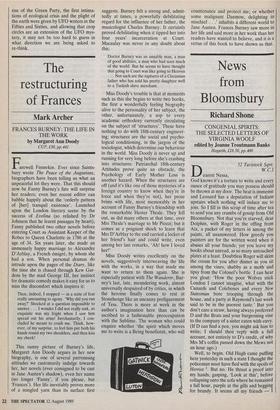The restructuring of Frances
Mark Archer
FRANCES BURNEY: THE LIFE IN THE WORK by Margaret Ann Doody
CUP, £30, pp.441
Farewell Fannekin. Ever since Saints- bury wrote The Peace of the Augustans, biographers have been telling us what an unpeaceful lot they were. That this should now be Fanny Bumey's fate will surprise her readers; even her recent editor can babble happily about the 'orderly pattern of [her] tranquil existence'. Launched upon the London literary scene by the success of Evelina (so relished by Dr Johnson that he learnt passages by heart), Fanny published two other novels before entering Court as Assistant Keeper of the Robes to Queen Charlotte in 1786 at the age of 34. Six years later, she made an immensely happy marriage to Alexandre D'Arblay, a French emigre, by whom she had a son. When personal dramas do intrude upon the pages of the Diary, like the time she is chased through Kew Gar- dens by the mad George III, her instinct for dramatic comedy makes it easy for us to miss the discomfort which inspires it:
Then, indeed, I stopped — in a state of fear really amounting to agony. 'Why did you run away?' Shocked at a question impossible to answer . . . I wonder I did not really sink, so exquisite was my fright when I saw him spread out his arms! Involuntarily, I con- cluded he meant to crush me. Think, how- ever, of my surprise, to feel him put both his hands round my two shoulders, and then kiss my cheek!
This sunny picture of Burney's life, Margaret Ann Doody argues in her new biography, is one of several patronising attitudes we customarily indulge towards her, her novels (ever consigned to be cast in Jane Austen's shadow), even her name (no longer 'Fanny', if you please, but `Frances'). Her life inevitably proves more of a mingled yarn than its surface first suggests. Burney felt a strong and, admit- tedly at times, a powerfully debilitating regard for the influence of her father, the musicologist Charles Burney. It certainly proved debilitating when it tipped her into four years' incarceration at Court. Macaulay was never in any doubt about this:
Doctor Burney was an amiable man, a man of good abilities, a man who had seen much of the world. But he seems to have thought that going to Court was like going to Heaven . . Not such are the raptures of a Circassian father who has sold his pretty daughter well to a Turkish slave merchant.
Miss Doody's trouble is that at moments such as this she begins to write two books, the first a wonderfully feeling biography alive to the personality of her subject, the other, unfortunately, a sop to every academic orthodoxy currently circulating on the subject of 'structures'. These have nothing to do with 18th-century engineer- ing; structures are the social and psycho- logical conditioning, in the jargon of the sociologist, which determine our behaviour in the world. Miss Doody is never up and running for very long before she's crashing into structures: Patriarchal 18th-century Attitudes prove quite an obstacle, the Psychology of Early Mother Loss is another hazard. When the structures are off (and it's like one of those mysteries of a foreign country to know when they're in force and when they're not), her prose brims with life, most memorably in her account of Fanny Burney's friendship with the remarkable Hester Thrale. They fell out, as did many others at that time, over Mrs Thrale's marriage to Mr Piozzi; but it comes as a poignant shock to learn that Mrs D'Arblay to the end carried a locket of her friend's hair and could write, even among her last remarks, `Ah! how I loved her!'
Miss Doody writes excellently on the novels, suggestively interweaving the life with the works, in a way that made me want to return to them again. She is especially patient with The Wanderer, Bur- ney's last, late, meandering work, almost universally despaired of by critics, in which the heroine finally comes to rest at Stonehenge like an uncanny prefigurement of Tess. There is more at work in the author's imagination here than can be ascribed to a fashionable preoccupation with the Sublime. The woman who could enquire whether 'the spirit which moves me to write is a Being beneficent, who will countenance and protect me; or whether some malignant Daemon, delighting in mischief . . .' inhabits a different world to Jane Austen. Frances Burney saw more in her life and said more in her work than her readers have wanted to believe, and it is a virtue of this book to have shown us that.










































 Previous page
Previous page